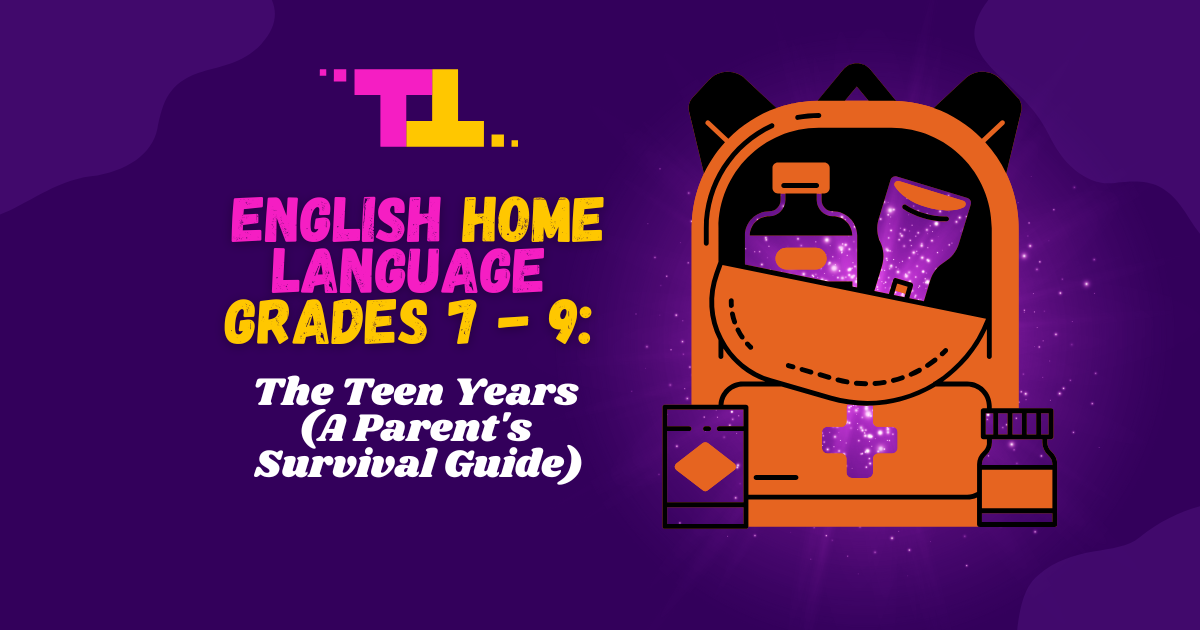English Home Language Grades 7-9: The Teen Years (A Parent’s Survival Guide)

Dear Brave Parents of Eye-Rolling Experts!
So your child has made it to the Senior Phase (that’s education-speak for Grades 7-9). They’re probably convinced they know everything already. (Spoiler alert: They don’t.) Let’s decode what they actually need to master during these interesting years.
The Foundation: What They Should Already Have Coming from Grade 6, your teen should be comfortable with:
- Reading texts without declaring them “too long” every three seconds
- Writing structured paragraphs (without ending every story with “…and then I woke up”)
- Using punctuation appropriately (not just random commas everywhere)
- Expressing ideas clearly (beyond “whatever” and “you know”)
Grade 7: The Reality Check Year
Reading Level
- Handle texts of 350-400 words (yes, that’s longer than a social media post)
- Actually analyse what they read (not just skim and hope for the best)
- Start thinking critically (those brain cells need a workout)
- Read between the lines (there’s more to life than TikTok captions)
Writing Goals
- Create essays of 150-200 words (4-6 paragraphs)
- Write formal letters that don’t read like text messages
- Express opinions with actual evidence (not just “because I said so”)
- Use proper language structures (grammar isn’t optional anymore)
Grade 8: The Plot Thickens
Reading Mastery
- Tackle texts of 400-450 words (Netflix summaries don’t count)
- Read critically and evaluate effectively
- Understand academic and formal texts (yes, real life uses these)
- Make informed judgments (beyond “this is boring”)
Writing Excellence
- Produce essays of 200-250 words (5-8 paragraphs)
- Write for any purpose or audience
- Create sophisticated arguments
- Use language with precision and style
Grade 9: The Final Boss Level
Reading Like a Pro
- Master texts of 450-500 words (without dramatic sighs)
- Analyse complex arguments
- Evaluate different viewpoints
- Think critically about everything they read
Writing Expertise
- Craft essays of 250-300 words (6-8 paragraphs)
- Write for any context professionally
- Develop well-structured arguments
- Use language with sophistication and flair
Important Parent Alerts!
Time Allocation (Per Two-Week Cycle)
- Listening & Speaking: 2 hours
- Reading & Viewing: 3 hours 30 minutes
- Writing & Presenting: 3 hours 30 minutes
- Language Structures: 1 hour (Yes, they need ALL of these – no skipping the “boring” parts!)
Warning Signs to Watch For
- Avoiding reading anything longer than a tweet
- Writing that looks like a text message
- Claiming punctuation is “so yesterday”
- Using “like” every third word
How You Can Help (Without Getting Eye Rolls)
- Encourage English use in daily life (Netflix in English counts!)
- Discuss current events (yes, they might actually talk to you)
- Help them find reading material they enjoy (even if it’s not Shakespeare)
- Stay patient (remember, you were once a teen too)
The Secret Sauce for Success
- Regular reading (yes, EVERY day)
- Writing practice (beyond social media posts)
- Speaking opportunities (family debates can be educational!)
- Grammar practice (it’s like push-ups for the brain)
Need help? Questions? Having a grammar emergency? We’re here – no judgment, just support!
Remember: You’re not just helping your teen pass English – you’re preparing them for life after school. And yes, that definitely deserves chocolate! 🍫
Your Partners in Teen-Wrangling at FlippedT
P.S. If your teen claims they “don’t need English because they’re going to be an influencer,” remind them that even influencers need to write good captions! 😉
It’s Not Just Us Saying This Stuff!
Look, we love making the English [Home Language/First Additional Language] curriculum fun at FlippedT, but don’t just take our word for it! Here are some official resources (warning: they’re a bit more… formal than we are):
Parent Tip: Don’t let the official documents overwhelm you – that’s exactly why we’re here! We transform these requirements into engaging, achievable learning adventures for your child. 😊
Note: All links were working at the time of publication. Government websites occasionally reorganise their content, so if you find a broken link, just let us know!
